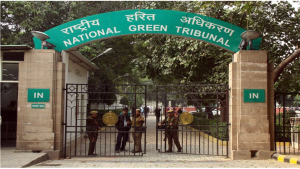
The National Green Tribunal (NGT) took Suo Motu cognizance of the matter relating to the extent of microplastic pollution in Ashtamudi Lake, a Ramsar wetland in Kollam district in Kerala.
The Petition is registered suo-moto on the basis of the news item dated 24.05.2024.
As per the news item, microplastics were found in the brackish-water lake’s fish, shellfish, sediment and water. The highest percentage composition of microplastics was found in the macro fauna, with fish accounting for 19.6% and shellfish 40.9%.
The news item quotes a study by the Department of Aquatic Biology and Fisheries, University of Kerala, with support from the Ecomarine Project co-funded by Erasmus programme of the European Union titled “Microplastic contamination in Ashtamudi Lake, India: Insights from a Ramsar wetland”. As per the study, detailed analysis of the samples revealed the presence of plastic polymers as well as hazardous heavy metals. Polymer composition of microplastics found in the guts of fishes and shell fishes included nylon, polyurethane, polypropylene, polyethylene, and polysiloxane.
The news item further highlights that hazardous heavy metals such as molybdenum, iron and barium, potentially adsorbed from the surroundings, were detected in the microplastics. The existence of hazardous heavy metals such as molybdenum, iron and barium, potentially adsorbed from the surroundings, were detected in the microplastics. The existence of these plastic polymers and heavy metals in microplastic samples poses a threat to vulnerable biota.
It states that untreated municipal solid waste and plastic debris making their way into the lake pose serious threats. Additionally, residences and resorts in close proximity to the lake may discharge domestic waste. Significant amounts of solid waste has been observed to be dumped directly into the water bodies. The inadequate management of plastic solid waste in the watershed areas, surrounding Ashtamudi Lake and the municipal sewers, further acts as sources of plastic debris in the lacustrine ecosystem. Fishing equipment such as nets, cages and monofilaments from fishing lines may account for the “heightened concentration” of nylon fibres.
Furthermore, the Ashtamudi wetland was designated a Ramsar site in 2002 considering the estuarine system’s “extraordinary importance for its hydrological functions, its biodiversity, and its support for fish.
New item raises substantial issue relating to handling of Hazardous Substance and compliance of environmental norms.
“Power of the Tribunal to take up the matter in suo-motu exercise of power has been recognized by the Hon’ble Supreme Court in the matter of “Municipal Corporation of Greater Mumbai vs. Ankita Sinha & Ors.” reported in 2021 SCC Online SC 897.”
Hence, Principal Bench of Justice Prakash Shrivastava , Justice Arun Kumar Tyagi and Dr. A Senthil Vel impleaded the following as respondents in the matter:
(i) Additional Chief Secretary, Environment, Kerala;
(ii) Kerala Coastal Zone Management Authority;
(iii) Kerala State Wetland Authority;
(iv) Member Secretary, Kerala State Pollution Control Board (KSPCB);
(v) Director Local Bodies, Kerala;
(vi) Director Tourism, Kerala;
(vii) Director Industries, Kerala;
(viii) Director Panchayat, Kerala,
(ix) CPCB, Regional Director through Member Secretary, CPCB;
(x) Regional Officer, MoEF&CC, Kerala.
The Bench issued notice to the Respondents and listed the matter on 13.09.2024.
